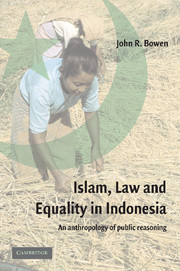Book contents
- Frontmatter
- Contents
- List of illustrations
- List of tables
- Acknowledgments
- Glossary
- Part 1 Village repertoires
- Part 2 Reasoning legally through scripture
- Part 3 Governing Muslims through family
- 8 Whose word is law?
- 9 Gender equality in the family?
- 10 Justifying religious boundaries
- 11 Public reasoning across cultural pluralism
- References
- Index
10 - Justifying religious boundaries
Published online by Cambridge University Press: 07 January 2010
- Frontmatter
- Contents
- List of illustrations
- List of tables
- Acknowledgments
- Glossary
- Part 1 Village repertoires
- Part 2 Reasoning legally through scripture
- Part 3 Governing Muslims through family
- 8 Whose word is law?
- 9 Gender equality in the family?
- 10 Justifying religious boundaries
- 11 Public reasoning across cultural pluralism
- References
- Index
Summary
In chapterchapter 8, I discussed the ambiguities concerning the state's right to pronounce on matters of Islamic law. Now I turn to the state's involvement in setting boundaries: boundaries between Muslims and Christians, between Muslims and the larger world, and between what is harâm and halâl, forbidden and permitted, in food, marriage, and everyday sociability. What is at stake in policing boundaries between religious communities? Does boundary-maintaining contradict the desire for equal, universal citizenship? Can it be viewed as a way of regulating difference, sustaining tolerance, or only as a manifestation of intolerance? Here the state finds itself both claiming the autonomy of religious reasoning and asserting its right to determine religious norms.
Separating by fatwa
As in many countries with large Muslim populations, Indonesia has a national body of Islamic jurists, the Council of Indonesian Ulama (Majelis Ulama Indonesia, MUI). The Council was created in 1975 by President Suharto during a period of a particularly high level of suspicion between religious leaders and the state. In a style that became typical of the New Order, Suharto tried to make the process appear as a bottom-up movement for change. Acting through his Minister of the Interior, Amir Machmud, Suharto first ordered each of the twenty'six provinces to create Councils of Ulamas, and only later developed the national council to coordinate the provincial bodies.
- Type
- Chapter
- Information
- Islam, Law, and Equality in IndonesiaAn Anthropology of Public Reasoning, pp. 229 - 252Publisher: Cambridge University PressPrint publication year: 2003



